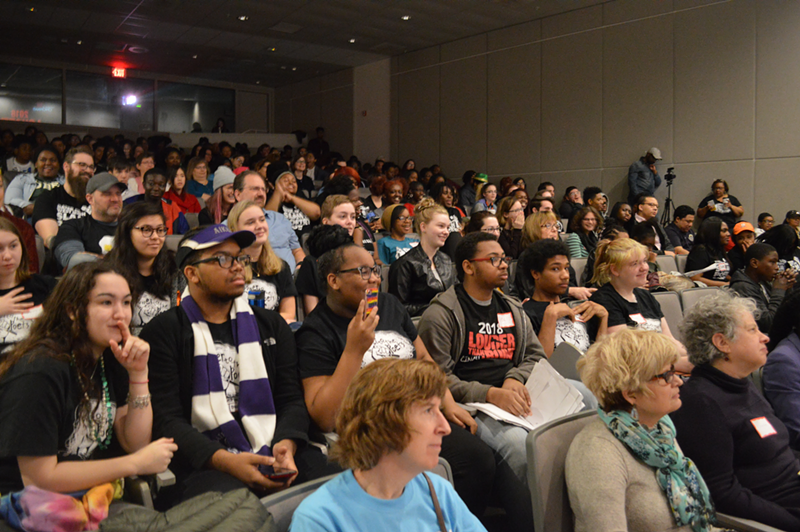Like time, poetry doesn’t stand still. Influenced by changes in music, literature, dance and performance art, poetry slams — theatrical readings of participants’ work — came along in the 1980s. And they have since become part of every city’s cultural scene, especially popular among students.
The finals for Cincinnati’s Louder Than A Bomb spoken word slam take place in the Harriet Tubman Theater at the National Underground Railroad Freedom Center at 5:30 p.m. Friday. This particular poetry program, founded in Chicago in 2001, is in its fourth year here and students from many local high schools and organizations are participating, including Walnut Hills, DePaul Cristo Rey, Western Hills and Aiken high schools. Semi-finals were held March 17 in the auditorium of the University of Cincinnati’s College of Design, Architecture, Art and Planning (DAAP.)
This poetry event was initially conceived post-9/11 by the organization Young Chicago Authors as a place for Chicago teenagers to congregate and express themselves through the medium of poetry. Sean Keating-Crawford, who joined UC’s Taft Research Center — dedicated to funding humanities scholarships — as program manager in 2013, learned about Louder when he attended the Chicago Humanities Festival in 2014. He and Taft Center Director Adrian Parr have explored different possibilities of actively engaging community members in the humanities and thought Louder would be a great fit.
“This has a feel of expressiveness, of giving voice to the younger generation that is typically ostracized, typically put to the side in this contemporary day, age, politics and what have you,” Keating-Crawford says. “As a humanities center, we really like the idea of trying to bring that kind of event to Cincinnati.”
The Cincinnati organizers for Louder are the Taft Research Center and the nonprofit Elementz, whose “Hip Hop, Respect, Community” programming includes a Voices of Freedom spoken word program. Schools are brought into the Louder fold through active recruitment by the two organizations.
Throughout the academic year, Elementz hosts a series of workshops, guest speakers and opportunities for teenagers interested in Louder to become better acquainted with spoken word, writing, poetry and performance. A mandatory event for participants, called Crossing the Street, is hosted at Elementz’s Over-the-Rhine center in February. And the center recently hired Jamie-Lee Morris to function as lead organizer of Louder, as well as to work on other educational initiatives.
“The whole journey in itself is so exciting, to see kids express themselves through poetry at this age,” Morris says. “(They’re developing) social emotional skills, and a lot of that is happening without us even saying anything. I’m excited to be cultivating a program that is allowing that process to happen.”
Subject matter explored by participants runs the full emotional gamut, from bullying to sexual orientation to trauma — nothing is off-limits. Before students get to the performance stage, though, they need to know how to get their words on paper. That’s where coaches like Manuel Iris come into play. An English teacher at DePaul Cristo Rey (and recently named Cincinnati’s 2018 Poet Laureate), he and fellow teacher Pat Brennan are Louder coaches.
“This competition and the act of writing poetry are a way to give them a voice to tell their story,” Iris says. “They find that everything can be a source of beauty. Their struggles are really a human struggle — this is going to help them, but also it’s going to help others.”
DePaul Cristo Rey senior Adiah Coffey, one of Iris’ students and a longtime Louder participant, echoes this sentiment.
“It is so empowering to know that people are hearing what I’m saying, and I get these three minutes up on stage where I can say nearly anything I want and they’ll try to understand,” she says. “There’s this camaraderie between the poets; we all know how much it takes.”
Students learn the difference between what Iris calls a “page poem” and a “stage poem” — meaning, some poems are better suited for performance aloud.
Coffey has been participating in Louder since she was a freshman and is now captain of the six-student poetry team at DePaul Cristo Rey.
“It’s caught fire,” she says. “The poetry team is almost as well-known or popular as the basketball team. It’s created a big sense of camaraderie within our school.”
Free tickets for Friday’s Louder Than A Bomb finals are available at eventbrite.com. For more information, visit louderthanabombcincy.com.






